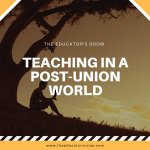On Monday, February 9th, 2015, Illinois Governor Bruce Rauner told the Chicago Tribute that he felt “government union bargaining and government union political activity are inextricably linked,” causing him to sign an Executive Order eliminating fair share policies for unions across the state. And for this, he is fundamentally wrong. Let’s explore a few questions to understand why:
What is fair share, anyway?
Fair share is a fee that applies to anyone in a union with a fair share clause. Any non-union member in the collective bargaining unit will have to pay a fee – usually somewhere around 80% of the cost of union membership – for the benefits that the union has guaranteed for them.
What is a collective bargaining unit (CBU)?
A CBU is pretty much what it reads to be. It’s a group of people (collective unit) that bargain a contract together. For most school districts, it involves the teachers, school nurses, counselors, psychologists, and occupational therapists. In some circumstances, it includes paraprofessionals, too.
So not everyone has to join a union?
Never.
Why do some people choose not to join a union?
For some people, it’s the political, religious, and personal reasons that Gov. Rauner referenced. Many union members see themselves as bastions of the left; I’ve argued that we need to refocus on education issues (and education issues only) to win back these non-members into our ranks.
Wait, didn’t the governor say that unions take money from non-members and apply them to political causes?!
That’s 100% completely false. Unions cannot use dues for political causes. We have separate funds for that in a political action committee (PAC). If this were political fraud, don’t you think the IRS would’ve been on to public sector unions by now?
What other reasons do people use to not join unions?
For most people I’ve spoken with, they claim it to be the cost of dues. Dues can be pretty expensive, so it’s difficult to argue. However, the solidarity of the union is what you pay for. Not belonging to it has certain costs, too. In some cases, the non-members are denied benefits of union membership.
What benefits are guaranteed for union members?
Most union leaders will quickly point out several items that all members of the collective bargaining unit are provided: a written out contract that is used as a constitution for the workforce, ensuring fair labor laws, the right to a grievance for wrong accusations and punishments, representation at meetings with management, right to reschedule meetings with management, the right to negotiate salary, discounts on goods and services, and more.
So what do non-members get?
Non-members don’t get all of what is mentioned above, but they are able to receive most of it. However, in non-fair share workplaces (like mine) they’re enjoying the benefits of a system without paying for it.
So why would a union leader would have to help non-members?
It’s all about non-discrimination (the employer cannot discriminate a union teacher vs. a non-union one), setting precedence, and benefiting all involved in the collective bargaining unit.
How have you helped non-members?
Though our union membership is approximately 80%, at least 40% of the meetings I’ve had questioning job performance have been with non-members of our union. I have to attend those meetings so that I ensure the expectations / punishments placed upon those teachers are fair, as they’ll set a precedence for future ones.
That seems strange. What else prompts the argument for fair share?
This past summer and winter, I was on our negotiations team. That was, by far, the most difficult endeavor I’d encountered in education up-to that date. When we secured a pay increase for our teachers, it was for all of our teachers. The strangest thing happened afterward: a few of the non-members of our bargaining unit sent me gift cards as a token of appreciation. They realized what we’ve done for them, and it was nice to show that they appreciated our bargaining agreement. But those who choose not to be a member get that at the incredible price of $0.
How is that fair?
It isn’t fair. That’s why there should be fair share systems in place throughout union workplaces across not just Illinois, but the nation. Even non-union members will realize the benefits of union membership. Some just don’t want to pay for them.





